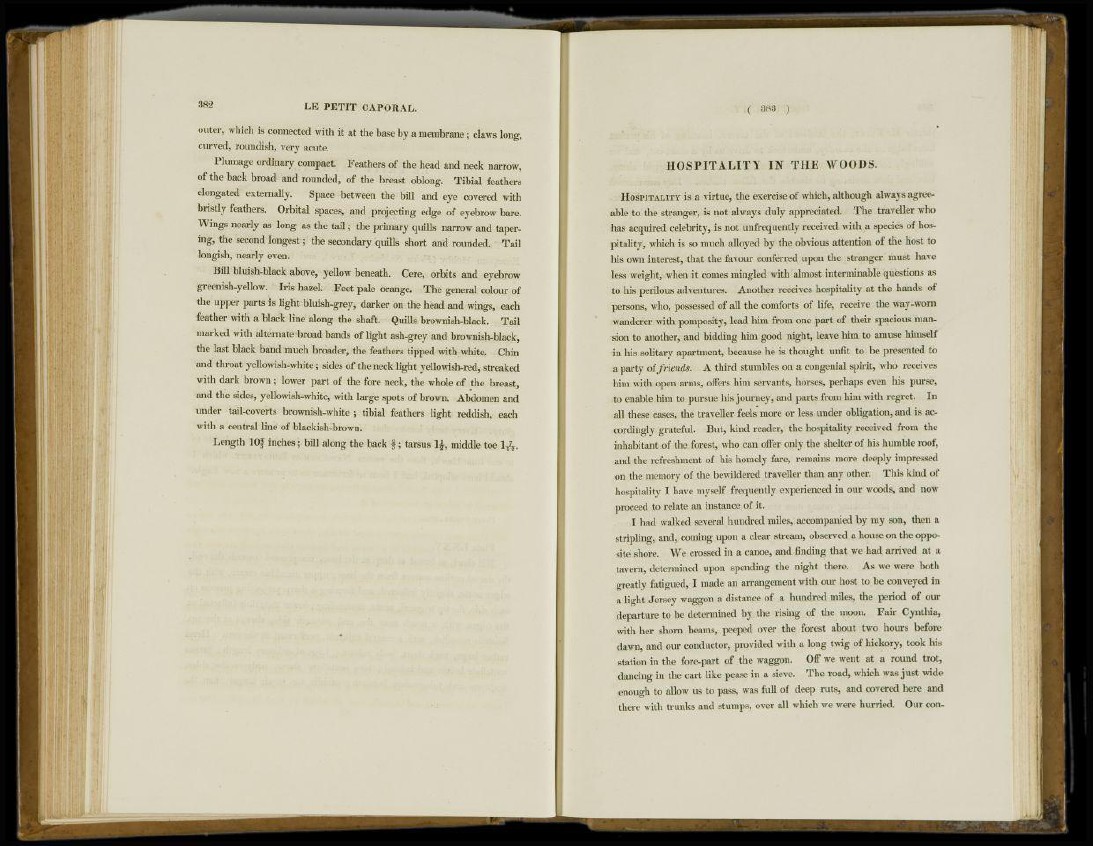
382 LE PETIT CAPORAL.
outer, which is connected with it at the base by a membrane; claws long,
curved, roundish, very acute.
Plumage ordinary compact. Feathers of the head and neck narrow,
of the back broad and rounded, of the breast oblong. Tibial feathers
elongated externally. Space between the bill and eye covered with
bristly feathers. Orbital spaces, and projecting edge of eyebrow bare.
Wings nearly as long as the tail; the primary quills narrow and tapering,
the second longest; the secondary quills short and rounded. Tail
longish, nearly even.
Bill bluish-black above, yellow beneath. Cere, orbits and eyebrow
greenish-yellow. Iris hazel. Feet pale orange. The general colour of
the upper parts is light bluish-grey, darker on the head and wings, each
feather with a black line along the shaft. Quills brownish-black. Tail
marked with alternate broad bands of light ash-grey and brownish-black,
the last black band much broader, the feathers tipped with white. Chin
and throat yellowish-white; sides of the neck light yellowish-red, streaked
with dark brown; lower part of the fore neck, the whole of the breast,
and the sides, yellowish-white, with large spots of brown. Abdomen and
under tail-coverts brownish-white ; tibial feathers light reddish, each
with a central line of blackish-brown.
Length lOf inches; bill along the back §; tarsus 1£, middle toe IrV
( 383 )
H O S P I T A L I T Y IN THE WOODS.
HOSPITALITY is a virtue, the exercise of which, although always agreeable
to the stranger, is not always duly appreciated. The traveller who
has acquired celebrity, is not unfrequently received with a species of hospitality,
which is so much alloyed by the obvious attention of the host to
his own interest, that the favour conferred upon the stranger must have
less weight, when it comes mingled with almost interminable questions as
to his perilous adventures. Another receives hospitality at the hands of
persons, who, possessed of all the comforts of life, receive the way-worn
wanderer with pomposity, lead him from one part of their spacious mansion
to another, and bidding him good night, leave him to amuse himself
in his solitary apartment, because he is thought unfit to be presented to
a party of friends. A third stumbles on a congenial spirit, who receives
him with open arms, offers him servants, horses, perhaps even his purse,
to enable him to pursue his journey, and parts from him with regret. In
all these cases, the traveller feels more or less under obligation, and is accordingly
grateful. But, kind reader, the hospitality received from the
inhabitant of the forest, who can offer only the shelter of his humble roof,
and the refreshment of his homely fare, remains more deeply impressed
on the memory of the bewildered traveller than any other. This kind of
hospitality I have myself frequently experienced in our woods, and now
proceed to relate an instance of it.
I had walked several hundred miles, accompanied by my son, then a
stripling, and, coming upon a clear stream, observed a house on the opposite
shore. We crossed in a canoe, and finding that we had arrived at a
tavern, determined upon spending the night there. As we were both
greatly fatigued, I made an arrangement with our host to be conveyed in
a light Jersey waggon a distance of a hundred miles, the period of our
departure to be determined by the rising of the moon. Fair Cynthia,
with her shorn beams, peeped over the forest about two hours before
dawn, and our conductor, provided with a long twig of hickory, took his
station in the fore-part of the waggon. Off we went at a round trot,
dancing in the cart like pease in a sieve. The road, which was just wide
enough to allow us to pass, was full of deep ruts, and covered here and
there with trunks and stumps, over all which we were hurried. Our con